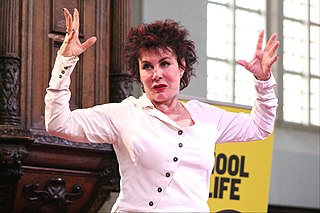A Quote by Joanna Trollope
Out of respect to writers, you have to read the book in the way in which the author visualised it going out into the world.
Related Quotes
In Africa, when you pick up a book worth reading, out of the deadly consignments which good ships are always being made to carry out all the way from Europe, you read it as an author would like his book to be read, praying to God that he may have it in him to go on as beautifully as he has begun. Your mind runs, transported, upon a fresh deep green track.
People are used to streaming and binge-watching. When they see an author they like, if there's only one book, even if they like the book, they're going to forget about you. The way to keep you in their mind and to get you to become a habit for these readers is you have to have a lot of product out there for them to read.
I read continually and don't understand writers who say they don't read while working on a book. For a start, a book takes me about two years to write, so there's no way I am depriving myself of reading during that time. Another thing is that reading other writers is continually inspiring - reading great writers reminds you how hard you have to work.
Reading a book should be a conversation between you and the author. Presumably he knows more about the subject than you do; if not, you probably should not be bothering with his book. But understanding is a two-way operation; the learner has to question himself and question the teacher, once he understands what the teacher is saying. Marking a book is literally an expression of your differences or your agreements with the author. It is the highest respect you can pay him.
I see a lot of writers who complain when their book doesn't sell and the reason that happens sometimes, is they don't know how to publicize or promote themselves. A writer is more successful when they're involved in their literary community somehow. It's very easy for an author's book to fade away if they don't get out in public and meet people.
I get letters from two kinds of readers. History buffs, who love to read history and biography for fun, and then kids who want to be writers but who rarely come out and say so in their letters. You can tell by the questions they ask - How did you get your ?rst book published? How long do you spend on a book? So I guess those are the readers that I'm writing for - kids who enjoy that kind of book, because they're interested in history, in other people's lives, in what has happened in the world. I believe that they're the ones who are going to be the movers and shakers.
I want my books to exist in the literary world, not only in the art world. I am interested in having a dialogue with other writers, and the readers of those writers. Someone who is reading a book of mine might not have visited my exhibitions related to it, but can still have a full, literary experience with that book. This would be a completely different experience from stepping into the show, not having read the book. One form is not illustrative of the other.
Miss Abigail, I want to be an author because writers know when a person is lonely. I mean, when Molly read me some books, those writers reached out and said, Look Gideon, we know about your loneliness and we know you're feeling downtrodden. And they said...I'll stand up for you. You're not lone anymore.
Everyone is hustling to get there, and get their two cents in, but are their ideas really well respected? Is there stance in society respected? Respect comes out of living the right way, but it does not always work out that way. People with money, power, they tend to get respect but the the real concept of respect is from people who are truthful and sincere about what is going on.
I doubt if I shall ever have time to read the book again -- there are too many new ones coming out all the time which I want to read. Yet an old book has something for me which no new book can ever have -- for at every reading the memories and atmosphere of other readings come back and I am reading old years as well as an old book.
"The best is oftentimes the enemy of the good;" and without claiming for an instant that title of good for my book, I do not doubt that many a good book has remained unwritten, or, perhaps, being written, has remained unpublished, because there floated before the mind's eye of the author, or possible author, the ideal of a better or a best, which has put him out of all conceit with his good.







































